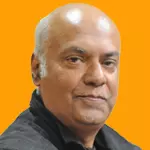
- Home
- India
- World
- Premium
- THE FEDERAL SPECIAL
- Analysis
- States
- Perspective
- Videos
- Sports
- Education
- Entertainment
- Elections
- Features
- Health
- Business
- Series
- In memoriam: Sheikh Mujibur Rahman
- Bishnoi's Men
- NEET TANGLE
- Economy Series
- Earth Day
- Kashmir’s Frozen Turbulence
- India@75
- The legend of Ramjanmabhoomi
- Liberalisation@30
- How to tame a dragon
- Celebrating biodiversity
- Farm Matters
- 50 days of solitude
- Bringing Migrants Home
- Budget 2020
- Jharkhand Votes
- The Federal Investigates
- The Federal Impact
- Vanishing Sand
- Gandhi @ 150
- Andhra Today
- Field report
- Operation Gulmarg
- Pandemic @1 Mn in India
- The Federal Year-End
- The Zero Year
- Science
- Brand studio
- Newsletter
- Elections 2024
- Events
- Home
- IndiaIndia
- World
- Analysis
- StatesStates
- PerspectivePerspective
- VideosVideos
- Sports
- Education
- Entertainment
- ElectionsElections
- Features
- Health
- BusinessBusiness
- Premium
- Loading...
Premium - Events

States governments join Centre in clamping down on YouTubers, journalists and activists; the commonality of approach is remarkable
A trend fashioned by the ruling BJP at the Centre has other political parties across states following suit.
Social media—websites and applications that enable users to create and share content or to participate in social networking—getting much too hot for the Indian political class. Once the preserve of the BJP, it now has takers across the political spectrum.
Conventional political wisdom suggests that the only way to curb such information—perceived to be defamatory, or inconvenient—is to demonstrate the parties’ formidable clout using the legal route.
Also read: Delhi court sets aside govt order on journalists over Adani Enterprises
Noted lawyer and activist Prashant Bhushan told this writer: “Following in the footsteps of the Central government, state governments too are trying to control the social media, since the mainstream media has in any case collapsed.”
Dharmasthala ‘mass burial’
Consider this. Earlier this week, the Karnataka High Court lifted a Bengaluru civil court’s gag order that had restricted media coverage of the Dharmasthala ‘mass burial’ case, a decision that YouTube channel Kudla Rampage had challenged, citing a violation of freedom of speech.
The Telangana High Court held that tweets, Facebook posts or criticisms of the government or chief minister cannot form grounds for criminal cases unless they incite violence or cause direct personal harm to an individual.
The High Court found the original order to be overly broad and lacking proper reasoning, noting it failed to specify what content was considered defamatory and effectively silenced public interest journalism. However, this decision was later challenged in the Supreme Court by Harshendra Kumar D, a key figure associated with the Dharmasthala temple in Karnataka.
Also read: 'India stifles free expression, media freedom': Report on Commonwealth nations
The controversy began after a former sanitation worker at the Dharmasthala Manjunathaswamy Temple claimed he was forced to bury bodies, many of them victims of sexual assault and murder, between 1995 and 2014.
Others in the South
Move further down South. On September 13, the Ernakulam Central Police under Kerala’s CPI(M) government booked journalist Siddique Kappan and 10 others on charges of unlawful assembly after they allegedly organised a protest meet in solidarity with Kochi-based journalist Rejaz B Sheeba Sydeek, who was booked under the Unlawful Activities (Prevention) Act.
The Telangana High Court on Wednesday (September 18) quashed three criminal cases registered against BRS social media activist Durgam Shashidhar Goud over his social media posts. The court pulled up the state government for indiscriminately filing cases against citizens over online criticism, calling the practice ‘illegal and impermissible’. It stressed that police must act as per law and the Constitution, and uphold fundamental rights, instead of attempting to curb dissent through undemocratic means.
The High Court held that tweets, Facebook posts or criticism of the government or chief minister cannot form grounds for criminal cases unless they incite violence or cause direct personal harm to an individual.
Also read: In Nepal, earlier uprisings, social media targeted soft underbelly of rigid state
YouTuber arrests
In March this year, a local court in Hyderabad granted bail to two YouTubers, Revathi Pogadadanda, managing director of Pulse Digital News Network, and Thanvi Yadav, an employee, who were arrested earlier for allegedly sharing content criticising Telangana Chief Minister A Revanth Reddy in a derogatory manner.
Critics claim that as news of alleged corrupt practices of Mamata Banerjee’s West Bengal government started hitting the headlines, the state government and the Trinamool Congress began targeting the accusers using the police.
The bail plea, filed by their lawyer Jakkula Ramesh, argued that their arrest was politically motivated and carried out under undue pressure. After hearing both sides, the court ruled in favour of the YouTubers, directing their release on bail, on provision of sureties, of course.
In Telangana alone, of the 266 cases, the highest number of 39 cases were booked against YouTubers.
YouTubers targeted
Free speech and political activism, once the bloodline of the Indian political system, are under siege as never before.
Following the BJP template of quelling uncomfortable questions, bureaucrats, religious organisations and leaders, companies, businessmen and even convicted criminals have managed to put the muzzle on facts that they find unpalatable.
Also read: YouTuber 'Savukku' Shankar detained under Goondas Act
In August last year, the Supreme Court issued notice to the state of Tamil Nadu and sought its responses after hearing a habeas corpus petition challenging the detention of YouTuber Savukku Shankar under the preventive detention law.
Shankar had earlier been held in preventive detention by the state police under the Goondas Act. In the habeas corpus petition, his mother alleged that the Tamil Nadu government curtailed his freedom of speech and expression so that he could not challenge the current government. She added that her son had played a vital role in exposing the corrupt and illegal activities of the ruling party in Tamil Nadu.
Police as accomplice
Critics say that over the past five years, corruption allegations in the Mamata Banerjee government hit the headlines, the West Bengal government and the Trinamool Congress began targeting those making the allegations using the police. In the crosshairs were a bunch of YouTubers who had garnered name and fame by ‘exposing’ the ruling dispensation.
Following in the footsteps of the Central government, state governments too are trying to control the social media, since the mainstream media has in any case collapsed: Lawyer & activist Prashant Bhushan
Senior advocate and CPI (M) Rajya Sabha member Bikash Ranjan Bhattacharya said: “Almost every YouTuber who has revealed embarrassing details or has been critical of the Mamata Banerjee government has been slapped with police cases on frivolous and trumped-up charges. These are meant to harass and browbeat them into silence. But it has backfired spectacularly. In almost all cases. Whenever these have been appealed against in the Calcutta High Court, the government has ended up with egg on its face.”
Jharkhand no better
Likewise in Jharkhand. This March, state health minister Irfan Ansari lodged a police case against a YouTube channel editor Kumar Kaushalendra for "lowering his image, indulging in character assassination and blackmail".
This is not a lone case either. In 2023, Tipu Sultan Khan alias Samar, a YouTuber from Jharkhand, was arrested for allegedly sharing objectionable and defamatory content against Chief Minister Hemant Soren and others on his YouTube channel. According to police, the content that Khan aired on his YouTube channel was “highly objectionable, insulting, derogatory and full of acrimony and caste bias.”
The YouTuber had been booked under various sections under the SC /ST Act, Prevention of Atrocities Act, along with sections of the IPC and the IT Act.
Adani Group action
On September 18, the Rohini District Court in Delhi reserved its judgment on a petition filed by senior journalist Paranjoy Guha Thakurta, who has challenged an injunction restraining him from publishing or circulating articles about Adani Enterprises Limited (AEL).
Clearly, these are troubling times for content creators and media outlets. Will the political class be successful in its design to clamp down on social media?
The order under challenge was passed ex parte on September 6, directing that certain publications, websites, and online platforms take down allegedly defamatory material against the Adani Group. Thakurta approached the court seeking to have the order lifted, contending that it amounts to a sweeping gag on reporting and undermines press freedom.
A statement issued by the New Delhi’s Press Club of India found the ex parte order passed by the Rohini District Court “extremely disturbing”.
“In an act of egregious judicial overreach, the court has put its stamp on the power to impose unrestrained censorship in the hands of corporate entities and the executive in the guise of insulating one of biggest business houses in the world from allegedly defamatory articles and audio-visual reports,” the statement said.
Troubling times
It added: “Equally disturbing is the way the Ministry of Information and Broadcasting galvanised into action, issuing yet another ex parte diktat to take down 138 YouTube links and 83 Instagram posts based on the court’s order, which was already under legal challenge.”
Clearly, these are troubling times for content creators and media outlets. Asked if the political class would be successful in its design to clamp down on social media, Prashant Bhushan said, “it depends upon the courts and public opinion”, but believed that “in the long run, it is not possible”.
That is about the only silver lining in an otherwise grim scenario.
(The Federal seeks to present views and opinions from all sides of the spectrum. The information, ideas or opinions in the articles are of the author and do not necessarily reflect the views of The Federal.)


